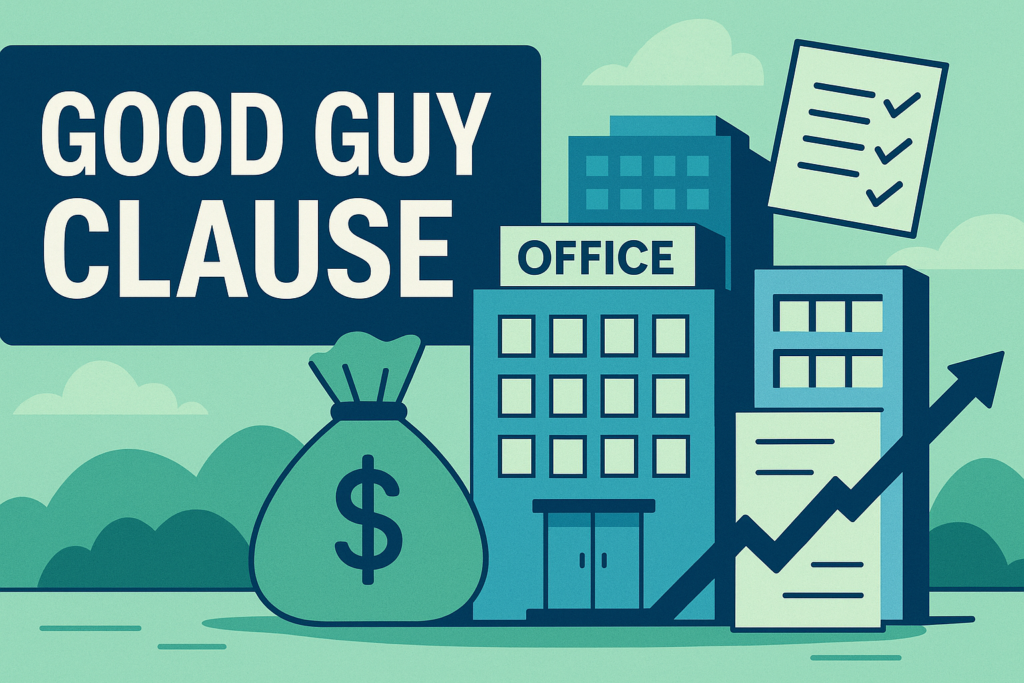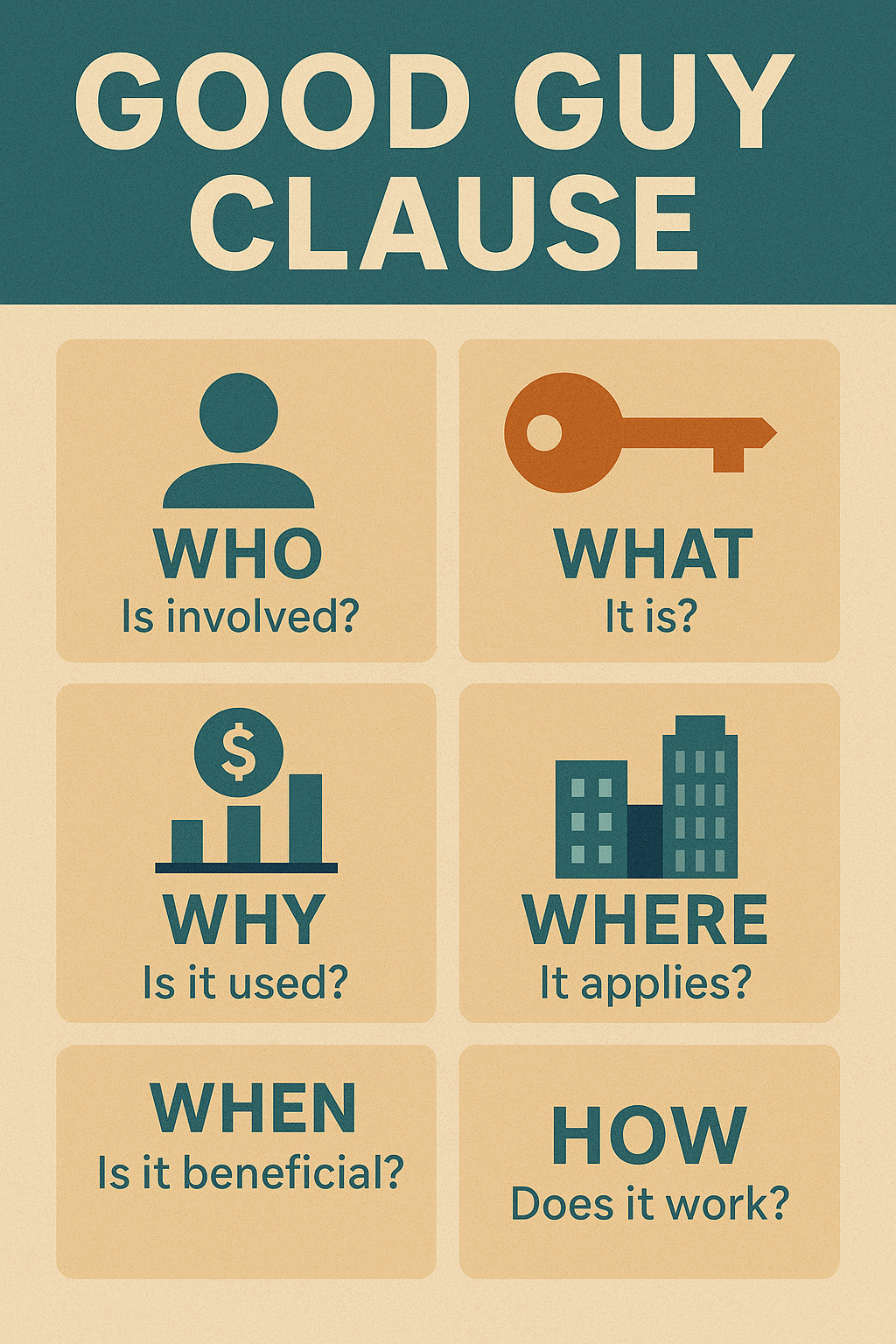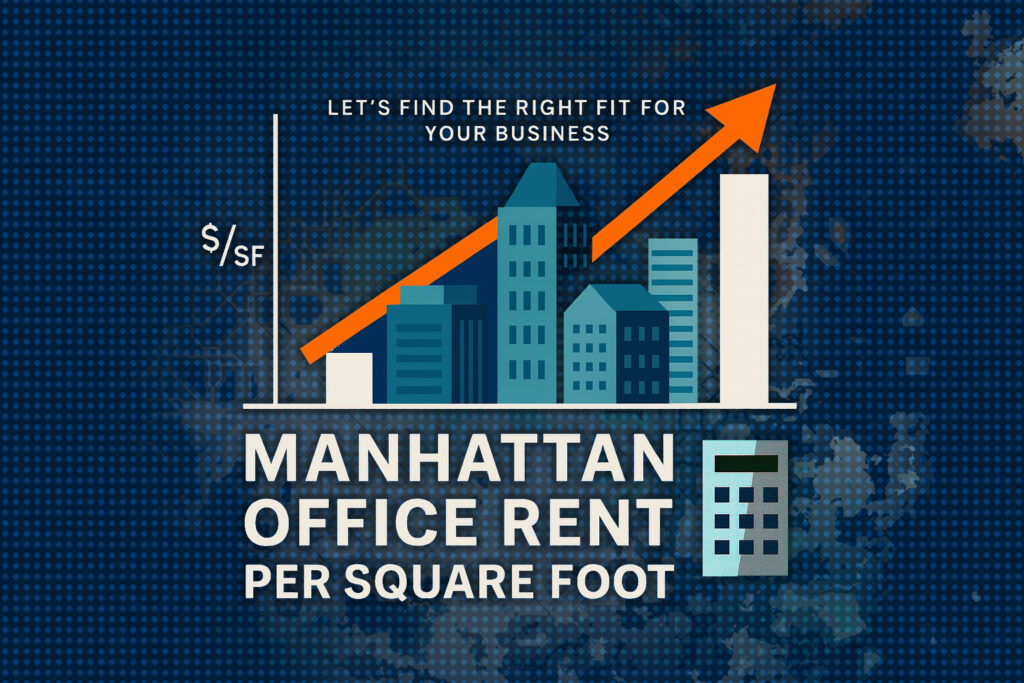Good Guy Clause

When navigating Manhattan office space leases, one term you’re likely to encounter is the Good Guy Clause. This clause can be a game-changer for both tenants and landlords in New York City’s commercial real estate market. In this article, we’ll break down who is involved in a Good Guy Clause, what it is, why it exists (and why you might want one in your lease), where it’s commonly used, when it comes into play, and how it actually works in practice. By the end, you’ll understand how a Good Guy Clause applies to Manhattan office leases – and how it can provide flexibility and peace of mind in an ever-changing business landscape.
What Is a Good Guy Clause?
A Good Guy Clause (also known as a Good Guy Guaranty or Good Guy Guarantee) is a provision typically found in New York City commercial leases that allows a tenant to terminate a lease early under certain conditions without suffering the full weight of the lease’s financial penalties. In simple terms, it’s a handshake agreement built into the contract: if the tenant needs to leave the space before the lease term ends, and they behave like a “good guy” by meeting specific requirements, they can walk away from the lease without ongoing personal liability for the remaining rent.
Under a standard commercial lease without this clause, tenants (or their business owners who often sign personal guarantees) are on the hook for all rent due for the entire lease term – even if they vacate early. The Good Guy Clause softens this harsh reality. It’s essentially a limited personal guarantee that is much narrower in scope than a traditional personal guarantee. The clause typically stipulates that if a tenant gives proper notice, pays all rent and expenses up to their move-out date, and leaves the space in good condition, the tenant’s guarantor is released from any obligation for future rent after they vacate. In other words, the business (and its owner who signed the guarantee) won’t be held liable for rent beyond the point of vacating the premises, as long as they’ve lived up to their end of the bargain.
This provision is extremely common in Manhattan office leases and has become a standard practice in NYC commercial real estate agreements. Outside of New York, you might not hear the term Good Guy Clause as frequently – it’s a concept born out of the unique conditions of the NYC real estate market – but within Manhattan, it’s considered a staple of responsible leasing. The clause’s name, “Good Guy,” literally implies that if the tenant does the right thing (by not stiffing the landlord or leaving a mess), the landlord will let them out of the lease without further trouble.
Why Do Manhattan Leases Have a Good Guy Clause?
You might wonder why landlords would agree to let a tenant off the hook early. The Good Guy Clause exists because it strikes a practical compromise that ultimately benefits both parties. Manhattan landlords began using this clause as a solution to a serious problem: commercial evictions in New York City are notoriously long, costly, and painful. If a tenant stops paying rent but refuses to leave the space, an eviction can take many months – even a year or more – during which the landlord loses income. This was a common scenario in the past: small companies in financial trouble would stop paying rent and still hold onto the space, forcing landlords into protracted legal battles.
The Good Guy Clause was created as a “win-win” solution to encourage tenants to voluntarily surrender the space if they can’t fulfill the lease. From the landlord’s perspective, the clause provides a great incentive for a peaceful surrender: the tenant has to leave the office in good shape and be paid up on rent, but in return the landlord gets the keys back sooner and can start re-leasing the space without a court fight. It’s far better to get a vacant, “broom-clean” office back quickly than to chase a delinquent tenant through the court system while the space sits empty and revenue-generating. Essentially, the Good Guy Clause helps landlords avoid lengthy eviction processes and minimize downtime.
From the tenant’s perspective, this clause is attractive because it provides flexibility and a safety net. Business conditions can change quickly – especially in a dynamic market like Manhattan. If a tenant’s business falters, needs to downsize, or has to relocate for any reason, the Good Guy Clause offers an exit strategy that isn’t financially ruinous. The personal guarantor (often the business owner or principal who signed the lease guarantee) knows that as long as they act honorably – i.e. give notice, pay what’s owed, and leave the space in acceptable condition – their personal liability ends once they’ve vacated the premises. They won’t be chased for years of future rent, which is a huge relief and risk reduction for anyone who’s put their name on the line. This peace of mind can even encourage entrepreneurs to sign a lease they might otherwise be nervous about, because the clause removes some apprehension about long-term commitments.
Another big why: Landlords often reward tenants who agree to a Good Guy Clause with cost-saving concessions. For example, it’s common for a landlord to accept a reduced security deposit if a Good Guy Guarantee is in place. Since the landlord has the guarantor’s promise to cover rent until move-out, they may not demand, say, six months of security deposit – they might settle for a smaller deposit, freeing up the tenant’s cash for other uses. This can be a significant upfront savings for tenants. In essence, the clause builds trust: the landlord trusts the tenant to be “good” if things go south, and in return the tenant might get more favorable lease terms (like that lower deposit or even slightly better rent conditions).
Who Is Involved in a Good Guy Clause?
A Good Guy Clause adds a third player into the landlord-tenant relationship: a personal guarantor, often one of the business owners or principals of the tenant company. Who signs the Good Guy Guarantee? Typically, the owner or partner of the tenant business signs on as the “Good Guy” guarantor. This person isn’t a stranger – it’s usually the very same person running the company or a major investor in it. By signing the guaranty, they are personally promising that rent and other lease obligations will be met while the tenant occupies the space, and that if the tenant needs to leave early, they (the guarantor) will ensure all the conditions of the Good Guy Clause are met. In a sense, the guarantor is saying, “If my company can’t pay, I’ll be the ‘good guy’ and make sure the landlord isn’t left high and dry – at least until we’re gone and the keys are returned.”
This clause is most common for small and mid-sized businesses leasing space in NYC. Large corporate tenants or publicly traded companies might not need a Good Guy Clause because landlords have other ways to secure those leases (such as parent company guarantees or hefty security packages). In fact, if a tenant is very financially strong or the landlords have other assurances, a Good Guy Clause might be omitted. But for the majority of Manhattan office leases – especially where the tenant is a startup, a boutique firm, or any private company – landlords will require either a full personal guarantee or a Good Guy Guarantee from a principal. Most tenants, given the choice, will opt for a Good Guy Clause over an unlimited personal guarantee every time, since it limits the scope of their personal liability dramatically.
It’s worth noting that both parties benefit from involving a Good Guy guarantor. The landlord gains confidence that there’s a real individual accountable for rent (not just an LLC that could vanish), which means the tenant has skin in the game. The tenant (guarantor) gains the protection that once they’ve acted as the “good guy” and vacated properly, their responsibility stops. No one expects to default on a lease, but having that guarantor in place with a predefined exit plan makes the lease feel more manageable for all sides.
Real estate brokers and attorneys are also involved in drafting and negotiating Good Guy Clauses. Your broker will ensure that a Good Guy Clause is included and fairly worded if you’re a tenant who needs that flexibility, and attorneys on both sides will tweak the language so that each party understands their rights and duties. But day-to-day, the key players you should remember are the landlord, the tenant company, and the individual guarantor (the “good guy” who signs on the dotted line).
How Does a Good Guy Clause Work?
So, how do you actually use a Good Guy Clause if it’s in your Manhattan office lease? There are specific steps and conditions baked into the clause that a tenant must follow to exercise it properly. Here’s a breakdown of how a typical Good Guy Clause works and what a tenant must do:
- Advance Notice to Landlord: The tenant must notify the landlord in writing that they plan to vacate early, usually specifying the exact date of surrender. The required notice period can vary, but it’s often between 60 and 180 days (about 3–6 months) in advance of leaving. This gives the landlord time to start marketing the space and lining up a new tenant. (The exact notice duration is negotiated in the lease – for example, a clause might require “90 days’ notice prior to surrender”.) Failing to give proper notice typically nullifies the Good Guy protection, so tenants need to mark that date on their calendar and send the notice via the required method (usually certified mail or an official delivery as outlined in the lease).
- Pay Rent and Obligations Through the Vacate Date: To be a “good guy,” the tenant must be fully paid up on all rent and any additional charges through the date they leave. This means no outstanding rent arrears, and covering any prorated rent if the move-out date isn’t exactly at month-end. In many clauses, it also includes paying any utility bills or common area charges due, basically settling all accounts. If you haven’t paid everything you owe up to the departure date, the guarantor remains liable and the landlord could pursue them for those funds. The Good Guy Clause does not wipe away owed rent; it simply stops new rent from accruing after you’re gone, assuming you’ve paid what you owe.
- Return the Space in “Broom Clean” Condition: This quaint term “broom clean” is standard lease lingo. It means the tenant must vacate the office space completely and leave it tidy – no furniture, no trash, and no damage beyond normal wear-and-tear. In practice, broom clean means you’ve removed all your property, swept/vacuumed the floors, patched any major holes or damage you caused, and basically handed over a presentable, empty space. If the space isn’t left in good condition, a landlord can claim the Good Guy Clause wasn’t properly honored. Many seasoned tenants will document the condition with photos during move-out to prove they met this requirement. Handing in the keys (or keycards) to the landlord or managing agent is usually the final step to confirm you’ve officially surrendered the premises.
- No Ongoing Liens or Subleases: A less obvious condition (but important) is that the tenant should not leave any legal complications attached to the lease. For instance, if you had sublet part of your space or assigned the lease to someone else, typically you need to unwind those arrangements or get the landlord’s consent to transfer everything, so that when you leave, no one else is still in the space and no other party has a claim on the lease. The landlord wants a truly clean break. Similarly, if there are any contractor liens or other encumbrances filed against the space due to the tenant’s actions, those should be resolved. Essentially, the tenant should leave with no strings attached.
If all of the above conditions are met, what happens is that the Good Guy guarantor’s obligations terminate on the vacate date. The tenant company itself may technically still be in breach of lease for leaving early (and the lease usually states that the landlord reserves the right to sue the tenant entity for the remaining lease obligations if they choose). However, if the tenant is a struggling company with no assets, that may not be practical for the landlord to pursue. The key point is, the individual guarantor – the person – is free and clear after that point, and the landlord gets their space back to re-rent. In many cases, landlords and tenants simply part ways at that stage without further legal action, because the space can be re-let. The security deposit in this scenario is typically forfeited to the landlord. Think of the security deposit as the price of the early exit; the landlord keeps it, but agrees not to chase the guarantor for more money after move-out.
It’s important to follow the Good Guy Clause process to the letter. If a tenant tries to use the clause but, say, gives only 30 days notice when 90 days was required, or leaves furniture and junk behind, the landlord can claim the tenant didn’t live up to the “good guy” conditions. In that case, the protection might vanish and the guarantor could be on the hook as if the clause wasn’t there. So, tenants should work closely with their broker or attorney when invoking a Good Guy Clause to ensure they do everything by the book. When done properly, it results in a streamlined, drama-free exit: no courtroom battles, no drawn-out evictions – just a respectful parting of ways.
Where Does the Good Guy Clause Apply?
The Good Guy Clause is most closely associated with Manhattan and the New York City commercial real estate market. This concept was born and bred in NYC, and that’s where it’s most prevalent. Manhattan office leases almost reflexively include Good Guy Clauses these days, especially for small to mid-size tenants, because it’s become an industry norm. If you’re renting an office in Midtown or Downtown Manhattan, you should expect a Good Guy Guarantee to be part of the lease package – it’s as common here as a security deposit or a rent escalation clause.
Outside of New York, you might not see or hear of Good Guy Clauses as often. Other cities and states have different norms for lease guarantees. For instance, in some markets landlords rely purely on large security deposits or corporate guarantees from well-established companies. But the term “Good Guy Clause” is largely unique to New York City. The reason it thrives here has a lot to do with the local legal environment and culture: New York’s tenant-landlord laws can make evictions lengthy, and the market historically had many entrepreneurial tenants who needed a safety valve in leases. Over time, landlords realized that offering this clause could actually attract responsible tenants and keep spaces filled, because tenants appreciate the flexibility. In fact, having a Good Guy Clause can be seen as a sign of a landlord-tenant relationship built on trust – it implies a bit of good faith on both sides.
That said, if you’re looking at leases in, say, New Jersey, Los Angeles, or other markets, don’t expect a “Good Guy Clause” to magically be in there. The concept may exist under a different name or not at all. It really is a New York-special. Within New York, it’s used across boroughs (Manhattan, Brooklyn, etc.), but Manhattan being the core of commercial activity, you’ll hear it most in that context. Class A office buildings, Class B loft spaces, retail storefronts – all types of Manhattan commercial properties might use Good Guy Clauses if the tenancy warrants it. Landlords may be slightly more flexible including a Good Guy clause in a tenant-favored market (when there’s plenty of vacant space and they need to entice tenants). In a tight market with high demand, a top-tier landlord might insist on a full personal guarantee or a larger deposit instead of a Good Guy Clause – but those cases are the exception rather than the rule.
Overall, Manhattan is the home of the Good Guy Clause, and tenants here should absolutely familiarize themselves with it.
When Might You Use a Good Guy Clause?
The “when” of a Good Guy Clause can be viewed in a couple of ways: when it originated, and when a tenant might actually invoke it. Historically, the Good Guy Clause concept emerged a few decades ago as NYC landlords dealt with protracted evictions in the 1980s and 1990s. Imagine an era of booming small businesses, and then some busts – landlords needed a mechanism to encourage a dignified exit when things didn’t work out. Over time, this clause became a standard part of lease negotiations in New York, and by the 2000s it was widespread in commercial leases across the city. So “when” it came about was in response to real-world challenges, and it has evolved into a modern leasing staple.
Now, more practically, when can a tenant use the Good Guy Clause in their lease? The answer: when unforeseen circumstances strike during the lease term and continuing the lease becomes untenable. Common scenarios include:
- Business Downturn or Closure: If your Manhattan-based business hits a rough patch – say sales plummet or funding dries up – and you can no longer afford the rent, the Good Guy Clause is your lifeline. By invoking it (giving notice and leaving properly), you can exit the lease early to stop the financial bleeding without being on the hook for years of future rent. This could be the difference between salvaging your business (or personal finances) and bankruptcy.
- Rapid Growth or Space Mismatch: It’s not always bad news that triggers a move. Maybe your startup took off and you suddenly need triple the space. Or maybe you leased a trendy open loft but realized six months in that you actually need private offices for your team’s work style. If you find a new location that better suits your staff size or layout needs, a Good Guy Clause allows you to “right-size” your office. For example, a company in a small Midtown space could give notice under the Good Guy Clause, then relocate to a larger office in a different building that fits their growth, without overlapping rent obligations (aside from the notice period). It provides agility – you’re not chained to an unsuitable space when opportunity calls.
- Relocation for Strategic Reasons: Perhaps you opened your office in Downtown Manhattan but most of your clients are uptown, or you decide you want a Class A building for a more prestigious image. If a prime space becomes available elsewhere, the Good Guy Clause gives you a path to relocate when timing is right. You’d still need to weigh the cost (forfeiting your deposit, moving costs, etc.), but at least you know exiting your current lease is feasible. In fast-moving markets, being able to seize a great location and gracefully bow out of your current one is a huge advantage.
- Personal Circumstances: In some cases, small businesses are closely tied to the owner’s personal situation. If a key owner experiences a life change (e.g., health issues or moving out of state) and needs to shutter or move the business, the Good Guy Clause can be invoked to end the lease early without personal ruin. Essentially, it’s there “when life happens,” offering a measure of compassion in a legal document.
It’s important to remember that you negotiate the Good Guy Clause at the time of lease signing – you can’t add it in later once trouble hits. So savvy tenants will ensure from the get-go that a Good Guy Clause is included in their Manhattan lease and that the notice period and conditions are reasonable. You might never need to use it (and hopefully your business thrives until the end of the lease!), but it’s like an insurance policy – you’re glad it’s there in case you do.
Also, consider when NOT to use it: If you’re close to your lease expiration or you can assign/sublet the space to someone else with landlord’s permission, those might be preferable routes to exit without forfeiting your deposit. The Good Guy Clause is a last resort early exit plan when other solutions aren’t available. And if you do decide to exercise it, carefully check the lease’s timing requirements – for instance, when exactly you need to send notice, when during the month to time your move-out, etc., to align with the clause’s rules. Timing is everything in making sure you qualify as the “good guy” under the agreement.
Balancing the Good with Other Tenant Concerns
While the Good Guy Clause is a crucial legal and financial consideration in a Manhattan office lease, it’s not the only factor on a tenant’s mind. Manhattan office seekers are also juggling practical questions about the space itself and how it fits their business. Here are some other key concerns tenants typically weigh, and how they intersect with your leasing decision:
- Budget: Cost is king for any business. Beyond just the monthly rent, tenants consider total lease costs – including that security deposit (which, thanks to a Good Guy Clause, might be lower), potential build-out expenses, utilities, and any furniture or IT setup costs. A Good Guy Clause can create cost-saving opportunities by reducing long-term liability and possibly the upfront deposit, but tenants still need to ensure the rent fits their budget projections. Always run the numbers for best-case and worst-case scenarios (e.g., “If we had to leave after a year using the Good Guy Clause, can we afford the loss of our deposit and moving costs?”). Knowing your budget limits will guide you to the right buildings and lease terms.
- Location & Image (Building Class): In Manhattan, your office address can speak volumes about your company’s identity. Are you aiming for a prestigious address in a Class A skyscraper with a grand lobby, or a funky loft in a Class B building in a trendy neighborhood? Location affects your brand image, client convenience, and often the rent price. A hedge fund might gravitate toward a Plaza District Class A building for the image and amenities, whereas a creative tech startup might prefer a downtown converted loft. Building class (A, B, or C) ties into that image and the quality of the building’s infrastructure. The Good Guy Clause doesn’t directly affect your location choice, but knowing you have flexibility to leave can give you confidence to take a space in a prime location – or conversely, it might let you take a chance on a new up-and-coming area, since you have an out if the location doesn’t work out for your team.
- Staff Size & Space Layout: Every business has unique space needs. Some teams thrive in an open “bullpen” layout (picture a large open room with desks or benching systems where everyone collaborates in the open), while others require private offices (e.g., a law firm with partner offices along the window line for confidentiality). When touring spaces, tenants think about how the layout will accommodate their staff size and work style. Do you need conference rooms, breakout areas, or high-density benching? If your headcount might change, you’ll also think about flexibility – can the space handle growth or contraction? This is where the Good Guy Clause subtly plays in: if your staff size could significantly increase or decrease, having a lease that you can exit (with the clause) provides a safety valve. You won’t be stuck in an office that’s too small for a booming team or paying for square footage you no longer need after a downsizing. It’s peace of mind as you plan your company’s growth trajectory.
- Furniture and Amenities: Setting up a new office can be a heavy lift. Some Manhattan offices come fully furnished and turnkey, which can save a lot of upfront cost and time. Others are delivered as empty “white box” spaces where you have to bring in everything from desks to espresso machines. Tenants often consider if furniture is included in the lease or if the previous tenant is willing to sell their existing furniture. A furnished space might let you move in and get to work immediately, which is great for a growing company. However, furnished spaces (often found in subleases or serviced offices) might have shorter terms and different lease structures that could or could not include a Good Guy Clause. Most direct leases for unfurnished space will have the Good Guy Clause standard. If you do invest in furniture, remember you’ll need to remove it (or find someone to take it over) if you execute the Good Guy Clause and vacate – leaving the space broom-clean means taking your furniture with you or disposing of it appropriately. So, factor that into your planning. Other amenities like shared conference facilities, kitchens, or reception services can also influence a decision – these make the space more plug-and-play for your staff.
In short, Manhattan tenants must balance the brick-and-mortar considerations (cost, location, layout, inclusions) with the lease terms (clauses like Good Guy, security deposit, rent escalations, etc.). A perfect space on paper might be a nightmare if the lease terms are too restrictive – and conversely, tenant-friendly lease terms provide little benefit if the space doesn’t meet your business needs. The Good Guy Clause adds a layer of flexibility and security that touches many of these concerns: it can affect your budgeting (less deposit, potential exit strategy), it can give you confidence in choosing a location (since you’re not absolutely locked in if it doesn’t work out), and it aligns with long-term planning for your staff and layout (knowing you have options if you need to change course).
Conclusion: Navigating Manhattan Leases with Confidence
Understanding the Good Guy Clause is essential for anyone renting office space in Manhattan. It’s one of those local terms that can significantly impact your risk and costs in a lease agreement. By now, you should have a clear picture of who the Good Guy Clause involves, what it entails, why it exists, and how it benefits tenants by providing flexibility, cost savings, and a more graceful exit if needed. Remember that a Good Guy Clause doesn’t mean you can walk away scot-free from any lease – you must uphold your end of the bargain and be, well, a “good guy” about it. But if you do, it can be a lifesaver for your business and personal finances, all while keeping things civil with your landlord.
If you’re in the market for Manhattan office space or need guidance on lease terms (like the Good Guy Clause or other clauses), you don’t have to navigate it alone. NewYorkOffices.com is here to help. With deep expertise in Manhattan commercial real estate, we can answer your questions, find a space that fits your budget and image, and negotiate lease terms that protect your interests. Whether you’re a startup looking for your first NYC office or an established company seeking flexibility in your lease, feel free to reach out to our team at newyorkoffices.com for friendly, knowledgeable assistance.
We’ll make sure you enter your next lease confident and well-informed – a good outcome for every good guy (and gal) in the New York office market!
Fill out our online form or give us a call today 212-967-2061 — let’s find the right space for your business.



